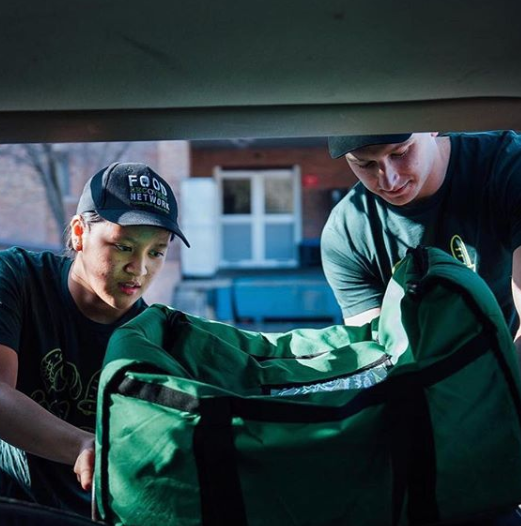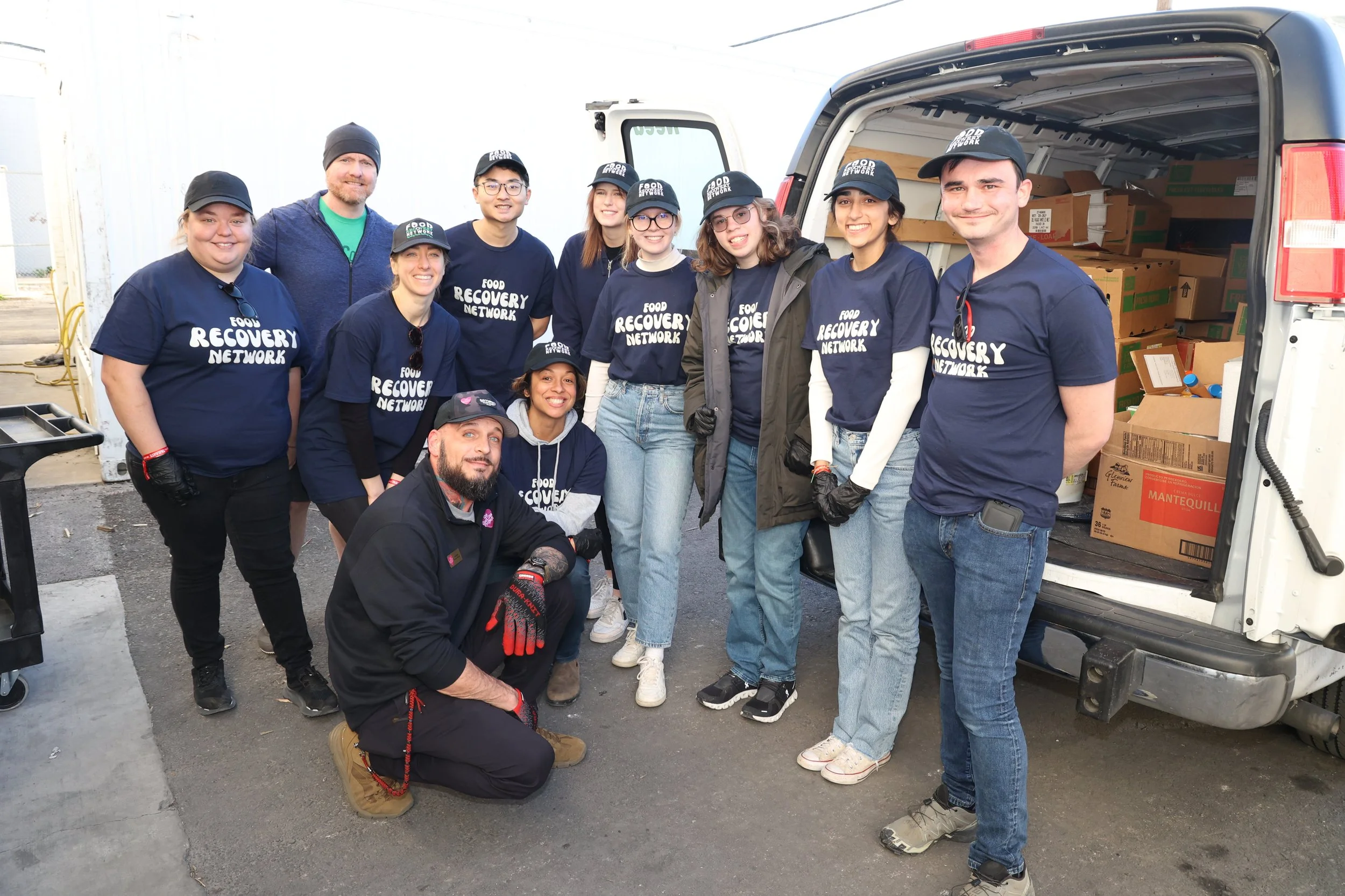FRN is excited to partner with Food Tank, a national organization that's mission is to alleviate "hunger, obesity, and poverty by creating a network of connections and information for all of us to consume and share." Throughout the country, FRN chapters and alumni will have “watch parties” to tune into Food Tank's Summit: Preventing Food Loss and Food Waste. With more than 30 confirmed speakers including John Boyd, Jr. and Tom Vilsack, FRN chapters will have the unique chance to have direct communication with some of the most influential individuals in the food recovery landscape. To register your viewing party, fill out this registration page by Thursday, September 9. Read Food Tank's press release below to learn more:
All-star lineup of food leaders and innovators gather in NYC at the WNYC Greene Space in Manhattan for a SOLD-OUT event to discuss how to stop food waste once and for all.
Food Tank, in partnership with Rethink Food Waste Through Economics and Data (ReFED) and with support from The Rockefeller Foundation and The Fink Family Foundation, will present a one-day summit on September 13, 2017, at the WNYC Greene Space in New York City (44 Charlton St., New York, NY, 10013), titled “Focusing on Food Loss and Waste.”
Confirmed speakers include (in alphabetical order—more to be announced soon): Emily Bachman, GrowNYC; Elizabeth Balkan, NYC Department of Sanitation (DSNY); John Boyd, Jr., National Black Farmers Association; Diane Brady, Bloomberg; Joan Briggs, The Fink Family Foundation; Gigi Lee Chang, FoodFutureCo; Chris Cochran, ReFED; Tom Colicchio, Craft restaurants; Karl Deily, Sealed Air; Ron Gonen, Closed Loop Partners; Alison Grantham, Blue Apron; Tony Hillery, Harlem Grown; Helen Hollyman, Vice; Lynette Johnson, Society of St. Andrews; Prasanta Kalita, University of Illinois at Urbana Champaign; Justin Kamine, KDC Ag – Kamine Development Corporation; Sam Kass, Trove; Amy Keister, Compass Group; Devon Klatell, The Rockefeller Foundation; Bonnie McClafferty, Global Alliance for Improved Nutrition (GAIN); Jude Medeiros, Sodexo; Clare Miflin, Kiss + Cathcart; Carina Millstone, Feedback; Monica Munn, The Rockefeller Foundation; Kimbal Musk, The Kitchen; Danielle Nierenberg, Food Tank; Pete Pearson, WWF; Tinia Pina, Re-Nuble; Antonio Reynoso, New York City Councilmember; Ruth Reichl, PBS/Food Writer; Brian Roe, The Ohio State University; Christine Datz-Romero, Lower East Side Ecology Center; Kim Severson, The New York Times; Stephanie Strom, The New York Times; Tom Vilsack, U.S. Dairy Export Council; Brian Wansink, Cornell University; Jocelyn Zuckerman, Modern Farmer; and Konstantin Zvereff, BlueCart.
More details here: https://www.eventbrite.com/e/focusing-on-food-loss-and-food-waste-2017-food-tank-summit-nyc-tickets-31681070936
With about 8 million residents, New York City alone sends 4 million tons of waste to landfills each year. An estimated one-third of that waste is food. As home to Hunts Point, the largest food distribution center in the world, New York City is primed to lead the nation’s (and even the world’s) food waste movement.
The 2017 Food Tank Summit in New York, NY, will consist of dynamic panel discussions featuring a variety of speakers from around the world and exciting keynote speakers moderated by journalists from The New York Times, Vice, Bloomberg, Modern Farmer, and more. Within just four hours of announcing the event, demand was so high that Food Tank received four-times more applications than there are seats.
Immediately following the Summit, Food Tank, in partnership with The Fink Family Foundation & Blue Hill Restaurant, will be hosting a special dinner discussion with leading thinkers such as Ruth Reichl, Sam Kass, David Barber, and Dan Barber around solutions to food waste. The evening will feature a special menu inspired by Chef Dan Barber’s wastED initiative, a pop-up devoted to the theme of re-using foods that would otherwise be wasted.
The Summit will be co-hosted by ReFED, the leading national organization dedicated to reducing U.S. food waste. In 2016, ReFED published the Roadmap to Reduce U.S. Food Waste, a landmark report that presented cost-effective solutions capable of cutting food waste by 20 percent while conserving natural resources, creating jobs, feeding the hungry, and generating $100B in economic value. ReFED now collaborates with businesses, nonprofits, and government to implement these solutions.
The Summit is also supported by The Rockefeller Foundation, which has committed $130 million through their YieldWise initiative to work with private, public, and nonprofit actors across the food supply system to cut their food loss and waste by half. Support from The Fink Family Foundation has also made this event possible.
At the New York City Food Tank Summit, audiences will have the opportunity to participate in extended question-and-answer sessions and expert journalists will moderate each panel—topics include leveraging capital to fund innovations and fill research gaps, forging creative partnerships, encouraging behavior change, and more.
The Food Tank Summit is also made possible with the support of the Barilla Center for Food & Nutrition, Sealed Air, Blue Apron, Organic Valley, Blue Hill Restaurant, and Niman Ranch. Food and beverage donations will come from Niman Ranch, Juice Press, Harmless Harvest, Brooklyn Roasting Co., and GT’s Kombucha.
Great Performances, a NYC-based catering and events company engaged in the principles of sustainability and food justice, is graciously donating the breakfast and lunch receptions for all attendees. The menus will reflect the company’s commitment to the reduction of food waste and the creative application of full-food utilization.
Through a national partnership, many Food Recovery Network and Oxfam Americaorganizations and chapters on more than one hundred campuses nationwide will be participating in Food Tank Summit watch parties live. Food Recovery Network is the largest student movement fighting hunger and food waste in the country. Oxfam America is a global movement of people working to end the injustice of poverty.
The following day on Thursday, September 14, 2017, Food Tank will be organizing a free public awareness event to benefit environmental nonprofit GrowNYC, featuring speakers to educate around food waste and showcasing its new dance fitness concept called Garjana at Washington Square Park (12:00 to 1:30pm). Garjana is led by a team of Broadway performers, featuring choreography from Mamma Mia’s Monica Kapoorand debuting all-original music from Douglas Romanow, whose credits include Justin Bieber, Tyga, and hundreds more. Garjana has been selling out major venues across New York and getting rave reviews from outlets ranging from Billboard, Time Out, Edible Magazine, and more. Conceived by Food Tank Board Chairman Bernard Pollackwith visuals and video by award-winning film and television director Kevin Arbouet. On September 28, Garjana will be making its Brooklyn debut at House of Yes.
More details here: https://www.eventbrite.com/e/free-outdoor-garjana-dance-fitness-party-in-nyc-for-grownyc-tickets-36368195251.
Since 2015, Food Tank has convened more than 275 speakers in front of more than 2,500 in-person attendees (all of our Summits have sold out!). More than 175,000 livestream viewers have tuned in from countries around the globe, representing six continents. Major food journalists from The Washington Post, National Public Radio, The Hill, Politico, National Geographic, and more have served as panel moderators. Food Tank Summits feature major partnerships with universities including George Washington University, Tufts University, the University of Chicago, University of California-Davis, and many more. In 2018, we will continue to bring Food Tank Summits to existing and new cities including Washington, D.C., Boston, Chicago, Seattle, San Diego, New York City, New Orleans, and more.The entire NYC Food Tank Summit can also be viewed remotely FREE via Facebook Live and live on FoodTank.com. Additionally, Food Tank will be featuring backstage interviews with speakers all day using Instagram Live and Periscope/Twitter Live. After the event, all videos will be immediately archived on Food Tank’s YouTube Channel.
ABOUT FOOD TANK
Food Tank is a nonprofit building a global community for safe, healthy, nourished eaters. We aim to educate, inspire, advocate, and create change. We spotlight and support environmentally, socially, and economically sustainable ways of alleviating hunger, obesity, and poverty and create networks of people, organizations, and content to push for food system change.
ABOUT ReFED
ReFED is a multi-stakeholder nonprofit, powered by a network of the nation’s leading business, nonprofit, foundation, and government leaders committed to reducing U.S. food waste. ReFED takes a data-driven approach to move the food system from acting on instinct to insights to solve our national food waste problem.
ABOUT THE ROCKEFELLER FOUNDATION
For more than 100 years, The Rockefeller Foundation’s mission has been to promote the well-being of humanity throughout the world. Together with partners and grantees, The Rockefeller Foundation strives to catalyze and scale transformative innovations, create unlikely partnerships that span sectors, and take risks others cannot—or will not. To learn more, please visit www.rockefellerfoundation.org.
A very limited number of press passes available—contact Bernard Pollack at 312-843-8612 or at bernard@foodtank.com.












